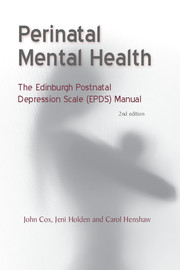Book contents
- Forntmatter
- Contents
- The authors
- Acknowledgments
- Abbreviations
- List of Figures
- Foreword
- Preface to the First Edition
- Preface to the Second Edition
- 1 Postnatal Depression: An Overview
- 2 The Origins and Development of the Edinburgh Postnatal: Depression Scale
- 3 International and Cross-Cultural Issues
- 4 Using the Edinburgh Postnatal Depression Scale in Clinical: Settings: Research Evidence
- 5 Humanistic and Person-Centred Interventions in Perinatal Depression
- 6 Screening and Intervention Services in the Community
- 7 Using the Edinburgh Postnatal Depression Scale
- Appendix 1 The Edinburgh Postnatal Depression Scale
- Appendix 2 Translations of the Edinburgh Postnatal Depression Scale
- References
- Index
Appendix 1 - The Edinburgh Postnatal Depression Scale
Published online by Cambridge University Press: 05 February 2021
- Forntmatter
- Contents
- The authors
- Acknowledgments
- Abbreviations
- List of Figures
- Foreword
- Preface to the First Edition
- Preface to the Second Edition
- 1 Postnatal Depression: An Overview
- 2 The Origins and Development of the Edinburgh Postnatal: Depression Scale
- 3 International and Cross-Cultural Issues
- 4 Using the Edinburgh Postnatal Depression Scale in Clinical: Settings: Research Evidence
- 5 Humanistic and Person-Centred Interventions in Perinatal Depression
- 6 Screening and Intervention Services in the Community
- 7 Using the Edinburgh Postnatal Depression Scale
- Appendix 1 The Edinburgh Postnatal Depression Scale
- Appendix 2 Translations of the Edinburgh Postnatal Depression Scale
- References
- Index
Summary
How are you feeling?
As you have recently had a baby, we would like to know how you are feeling now. Please underline the answer which comes closest to how you have felt in the past 7 days, not just how you feel today. Here is an example, already completed:
I have felt happy:
Yes, most of the time
Yes, some of the time
No, not very often
No, not at all
This would mean: ‘I have felt happy some of the time during the past week’. Please complete the other questions in the same way.
In the past 7 days
1. I have been able to laugh and see the funny side of things:
As much as I always could
Not quite so much now
Definitely not so much now
Not at all
2. I have looked forward with enjoyment to things:
As much as I ever did
Rather less than I used to
Definitely less than I used to
Hardly at all
3. I have blamed myself unnecessarily when things went wrong:
Yes, most of the time
Yes, some of the time
Not very often
No, never
4. I have been anxious or worried for no good reason:
No, not at all
Hardly ever
Yes, sometimes
Yes, very often
5. I have felt scared or panicky for no very good reason: Yes, quite a lot
Yes, sometimes
No, not much
No, not at all
6. Things have been getting on top of me:
Yes, most of the time I haven't been able to cope at all
Yes, sometimes I haven't been coping as well as usual
No, most of the time I have coped quite well
No, I have been coping as well as ever
7. I have been so unhappy that I have had difficulty sleeping:
Yes, most of the time
Yes, sometimes
Not very often
No, not at all 8. I have felt sad or miserable:
Yes, most of the time
Yes, quite often
Not very often
No, not at all
9. I have been so unhappy that I have been crying:
Yes, most of the time
Yes, quite often
Only occasionally
No, never
- Type
- Chapter
- Information
- Perinatal Mental HealthThe EPDS Manual, pp. 75 - 78Publisher: Royal College of PsychiatristsPrint publication year: 2014

